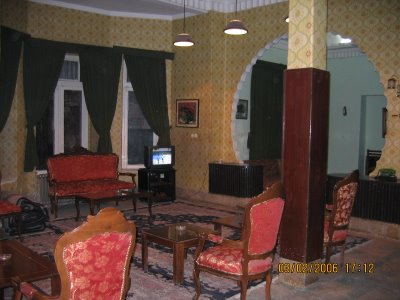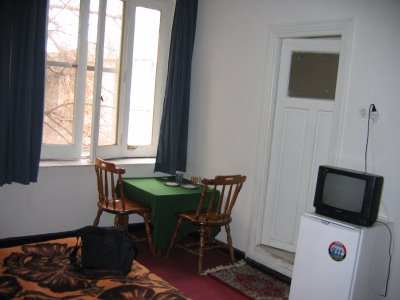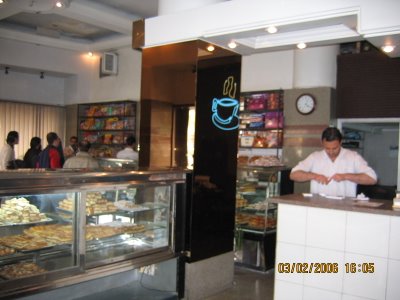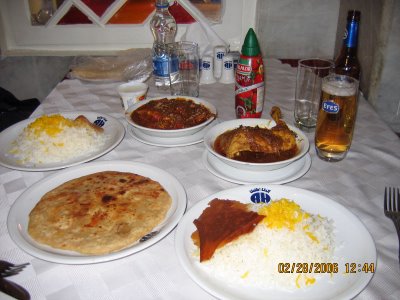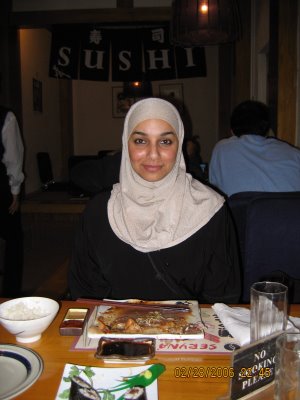Hello/Salaam All,
From looking at the tracking data, it seems that our visitors are mostly friends and family. I was a bit disappointed not to see any governmental-looking hits. I suppose I figured at least somebody in one of the various diplomatic, intelligence, and/or military branches would have found the site and found something useful on it.
But alas, Bush just announced his newest plan to "spread democracy" to Iran. When I first heard of it a few weeks back I had to scratch my head and try to figure out how anybody thought that it was a good idea. This new plan just set the US ten years back on any improvements they'd have hoped to make. The Washington Post article pretty much exposes the flaws of W's newest Crusade, so please read on.
Honestly, in some entries in our blog and some of fellow blogger Brian Anthony in Syria's blogs, we've already given a better (and free) guide to how the US ought to engage with Iran (among others) than anything any government organ seems to have come up with. Actually, there are probably some good folks in the government who understand, but it appears none of them have the ears of those in charge...whoever is making decisions there has absolutlely no grasp on the lives, culture, religion, and dreams of the people of this part of the world.
And that's not good for anybody.
Peace,
Irfan Ali/Robert
---------------------------------------------------------------------------------------------
U.S. Push for Democracy Could Backfire Inside Iran
By Karl Vick and David FinkelWashington Post Foreign ServiceTuesday, March 14, 2006; A01
TEHRAN -- Prominent activists inside Iran say President Bush's plan to spend tens of millions of dollars to promote democracy here is the kind of help they don't need, warning that mere announcement of the U.S. program endangers human rights advocates by tainting them as American agents.
In a case that advocates fear is directly linked to Bush's announcement, the government has jailed two Iranians who traveled outside the country to attend what was billed as a series of workshops on human rights. Two others who attended were interrogated for three days.
The workshops, conducted by groups based in the United States, were held last April, but Iranian investigators did not summon the participants until last month, about the time the Bush administration announced plans to spend $85 million "to support the cause of freedom in Iran this year."
"We are under pressure here both from hard-liners in the judiciary and that stupid George Bush," human rights activist Emad Baghi said as he waited anxiously for his wife and daughter to emerge from interrogation last week. "When he says he wants to promote democracy in Iran, he gives money to these outside groups and we're in here suffering."
The fallout illustrates the steep challenge facing the Bush administration as it seeks to play a role in a country where American influence is called unwelcome even by many who share the goal of increasing democratic freedoms.
"Unfortunately, I've got to say it has a negative effect, not a positive one," said Abdolfattah Soltani, a human rights lawyer recently released from seven months in prison. After writing in a newspaper that his clients were beaten while in jail, Soltani was charged with offenses that included spying for the United States.
"This is something we all know, that a way of dealing with human rights activists is to claim they have secret relations with foreign powers," said Soltani, who co-founded a human rights defense group with Nobel laureate Shirin Ebadi. "This very much limits our actions. It is very dangerous to our society."
Activists here said the Bush initiative demonstrates the chasm that often separates those working inside Iran for greater freedoms -- carefully calibrating their actions to nudge incremental changes in a hostile system -- and the more strident approach of many Iranian exiles who often have the ear of Washington policymakers.
"Our society is very complicated," said Vahid Pourostad, editor of National Trust, a new newspaper aligned with Iran's struggling reform movement. "Generally speaking, it is impossible to impose something from outside. Whatever happens will happen from inside.
"It seems to me the United States is not studying the history of Iran very carefully," Pourostad said. "Whenever they came and supported an idea publicly, the public has done the opposite."
Advocates and ordinary Iranians say the U.S. project also may suffer from poor timing. Just four years ago, the Iranian public's appetite for greater freedom was vibrant here, with a reformist president, Mohammad Khatami, returned to office in a landslide and his allies in control of parliament.
But public disillusionment grew steadily as the reformists failed to wrest crucial powers from the appointed clerics who control much of the power in Iran's theocratic system of government. The clerics cemented their grip by excluding dissenters from subsequent elections.
At the same time, hard-liners in the government maintained relentless pressure against independent institutions, closing more than 100 newspapers and jailing students by the hundreds. Many had ventured into the streets at the encouragement of satellite TV stations run by exile groups that breathlessly announced a new revolution in the offing.
"They said I would be joined by millions," said one student, who endured a beating by paramilitary militiamen unleashed against the demonstrators. "I just got beat up."
Today, Pourostad said, the capacity for civil society is so depleted that homeowners cannot be bothered to protest the cutting of trees in an eastern Tehran park to make way for a freeway extension.
"If such a thing had happened four or five years ago, the newspapers could have mounted a social movement," he said. "Now, we can put it in the paper, but we can't create a social wave. A disaster happens, but we can't do anything about it."
The Bush administration is asking Congress for $75 million in emergency funding to promote democracy in Iran, in addition to $10 million already budgeted. Most of the money, $50 million, would be spent to build a satellite television station. The plan also calls for $5 million each for scholarships and public diplomacy that includes fostering independent media inside Iran.
The final $15 million would go toward nongovernmental organizations and civic education on the lines of what the federally chartered National Endowment for Democracy carries out in a wide variety of countries.
"It's going to be hard for them to spend it here," said a diplomat at a European embassy in Tehran, who spoke on condition of anonymity. The diplomat refused to be identified because the embassy has had some success with a program aimed at fostering reform in one Iranian ministry and publicity could make it a target of hard-liners.
"There is a downside," the diplomat said. "There always is. And they'll have to be clever about how they spend it."
Iran on Monday lodged a formal complaint against the Bush plan through the U.S. Interests Section at the Swiss Embassy here. At the same time, Iran's parliament allocated the equivalent of $15 million to "probe and defuse" U.S. conspiracies and interventions in the country, according to the official Islamic Republic News Agency.
The experience of Baghi's group is cast as a cautionary tale for all concerned, including a prosecutor notorious for using arrests and detention to make examples.
Baghi, 44, has been prominent in Iran's reform movement for a decade. Once a theology student, he worked in sociology and came to prominence as an investigative journalist. After writing articles that exposed the role of Iran's Intelligence Ministry in the murders of dissidents in the 1990s, he served three years in prison.
After his release he started a newspaper, Jumhuriyat. Prosecutors closed it after 13 issues. He then founded the Society for Protecting Prisoners' Rights, a group that provides free attorneys for inmates and lobbies Iran's judiciary for due process and humane treatment.
Baghi said a friend in Europe approached him 16 months ago with a proposal to send members of the group to Dubai for a "human rights workshop." The friend gave the impression the United Nations was involved, Baghi said.
Unable to attend because authorities continue to withhold his passport, Baghi sent three other members of the rights group: his wife, Fatehmeh Kamali; their adult daughter, Maryam Baghi; and Ali Afsahi, a cleric turned film critic. Kamali's nephew, Ehsan, a law student who lived with them, went along for the ride, Baghi said.
By all accounts, the workshops did not go well. "They were very angry about this trip," Baghi wrote his friend in an e-mail. "They felt offended and insulted."
Quoting his wife, who was not available to be interviewed because of her interrogation, Baghi said the workshops offered only rudimentary training in human rights. Other sessions highlighted popular revolts in Serbia, Ukraine and elsewhere. The three Iranians were the only participants and were moved from one hotel to another by the organizers, who conjured an air of cloak and dagger, Baghi said.
"You know what a vulnerable situation we have here in Iran," Baghi wrote. "It was not a good thing to invite us to such a workshop."
Peter Ackerman, who chairs the Washington group that ran a portion of the workshops, took issue with Baghi's description. Ackerman said the International Center on Nonviolent Conflict promotes the potential of nonviolent change by highlighting experiences in formerly oppressive countries, as depicted in the film "A Force More Powerful," which was screened in Dubai.
Baghi's group left Dubai early, saying the workshops were not what they had expected. Back in Iran, their attendance brought no immediate repercussions, even though it apparently was known to government security services. Baghi said the intelligence office of the Higher Education Ministry asked his daughter about the trip while vetting her for a graduate degree four months ago.
Then on Feb. 12, with reports emerging in Washington of the Bush initiative, Afsahi was taken into custody. Ehsan Kamali, the law student, was detained at a filling station four days later. Both remain in solitary confinement in Evin Prison in the north of Tehran, their condition unknown.
Baghi's wife and daughter were summoned to a prosecutor's office last Tuesday, when a Washington Post reporter arriving for a previously scheduled appointment found Baghi cursing Bush. The women were questioned into the night for three days by deputies of the Tehran prosecutor, Said Mortazavi, the government's most widely feared enforcer.
Diplomats said pressure on individuals has increased since the election of Mahmoud Ahmadinejad as president and the showdown over Iran's nuclear ambitions.
"The people who did this workshop don't realize what kind of world we live in here," Baghi said. "Here, we've got Mortazavi and the system behind him. The other side has got the U.S. and its money. The pressure is on people who are trying to promote human rights inside the country.
"I feel Ahmadinejad and President Bush are like two blades of a scissor."
Ackerman took a different view.
"The question is: Why are they going to jail?" he said. "What kind of people are sending these people to jail? What's going on here is wrong. It's despicable."
Finkel reported from Washington.
© 2006 The Washington Post Company


